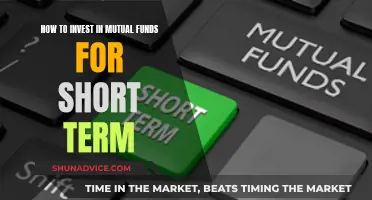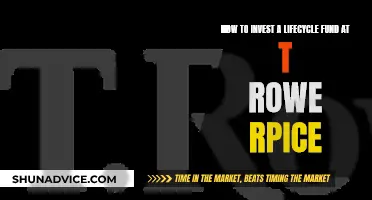
Index funds are a popular investment choice in Singapore, offering a low-cost, low-risk way to invest in stocks and other assets. By tracking a specific market index, such as the STI index in Singapore, index funds provide investors with broad market exposure and low portfolio turnover. One of the cheapest and easiest ways to access index funds in Singapore is through Exchange-Traded Funds (ETFs) traded on the Singapore Stock Exchange (SGX).
Before investing in index funds, it is important to understand how they work and the potential risks involved. Index funds hold a collection of stocks that make up a specific index, and if a company leaves the index, the fund manager will sell and replace those stocks. This makes index funds safer than buying stocks directly from a company and requires less management.
When investing in index funds in Singapore, individuals can choose between traditional index funds and ETFs. Traditional index funds, such as those offered by BlackRock and Vanguard Investments, may require a higher minimum investment, while ETFs can be bought and sold throughout the day on a major exchange, like a stock, making them more accessible and easier to enter or exit.
Whether choosing traditional index funds or ETFs, investors should consider their investment goals, risk tolerance, and the performance and volatility of the underlying index. Additionally, it is important to remember that investing carries risks, and there is no guarantee of returns.
| Characteristics | Values |
|---|---|
| Type of Investment | Exchange-Traded Funds (ETFs) or Mutual Funds |
| Investment Vehicle | Index Funds |
| Index Tracked | Straits Times Index (STI) or S&P 500 |
| Investment Cost | Low fees, low cost, low management fees |
| Investment Risk | Low risk, safer than direct stock market investing |
| Investment Return | Greater returns than individually managed stocks |
| Investment Accessibility | Accessible through fund managers, online stock broker platforms, or full-service brokers |
| Investment Options | Lump-sum investing, dollar-cost averaging strategy, robo-advisory trading platforms |
| Number of ETFs in Singapore | 45 |
| Number of Robo-Advisory Trading Platforms in Singapore | 11 |
| Number of RSS Providers in Singapore | 4 |
What You'll Learn

Index funds vs Exchange-Traded Funds (ETFs)
Index funds and exchange-traded funds (ETFs) have become increasingly popular in Singapore and worldwide. Both investment vehicles offer low-cost ways for individuals to gain broad market exposure. While they share similarities, there are key differences to note.
Index funds are a broad category that includes passively managed mutual funds and ETFs. They track the performance of a specific market index, such as the S&P 500 for large US stocks or the Straits Times Index (STI) in Singapore. The appeal of index funds lies in their simplicity and cost-effectiveness. They require minimal active management, resulting in lower expense ratios compared to actively managed funds. Index funds are priced once daily after the market closes, and investors buy or sell shares directly from the fund company. They are ideal for investors seeking a low-risk method of long-term investing.
ETFs, on the other hand, are funds traded on stock exchanges like individual stocks. They offer investors a basket of securities, such as stocks, bonds, commodities, or currencies, in a single transaction. ETFs can be both actively and passively managed. They are highly liquid, traded throughout the day, and priced based on supply and demand. ETFs typically have lower initial investment requirements and can be bought for less than $100. They are also more tax-efficient than traditional funds due to their "in-kind" creation and redemption process, minimising capital gains distributions.
In Singapore, index funds and ETFs have some similarities, with ETFs being the more accessible option. ETFs are traded on the Singapore Stock Exchange (SGX) and are a popular choice for investors looking to track the STI. They are easier to access and have lower minimum cost requirements than traditional index funds. Traditional index funds often require a higher minimum investment, typically more than $5,000. Additionally, ETFs can be purchased through a brokerage account or a regular shares savings (RSS) provider, making them more accessible to retail investors.
When deciding between index funds and ETFs, investors should consider their investment goals, risk tolerance, and liquidity needs. Both options provide broad market exposure and diversification, but ETFs offer more flexibility in trading and lower initial investment requirements. However, traditional index funds may have advantages in terms of transaction fees and taxation. Ultimately, the choice between index funds and ETFs depends on the investor's specific needs and preferences.
Vanguard Funds: Where to Invest Your Windfall
You may want to see also

The benefits of index investing
Index investing is one of the easiest ways to get started with investing and requires little financial knowledge. It is a great way to make your money work harder without the hassle of picking individual stocks or hiring an expensive advisor.
Low Fees and Low Risk
Index funds are passively managed, which means they have lower management fees than other funds. This is because the fund simply mimics the performance of a designated index, eliminating the need for a research team to analyse securities and make recommendations.
Additionally, index funds are considered low-risk investments. They are less volatile than individual stocks and are therefore safer than direct stock market investing.
Instant Diversification
Index funds offer instant diversification as they provide exposure to a basket of stocks or other assets. This reduces the risk of losing money as your portfolio is not overly concentrated in relying on the fortunes of a single company.
For example, investing in the Straits Times Index (STI) in Singapore means investing in the 30 largest public companies in the country, including DBS, Singapore Airlines, and Singtel. This diversifies your portfolio across different stocks and sectors and reduces the impact of any single stock's performance.
Time and Cost Savings
Index funds save time and money by eliminating the need to hand-pick individual stocks, which can be tedious and costly. By investing in an index, you gain exposure to a diverse range of companies without spending hours on research.
Additionally, a buy-and-hold strategy offered by index funds minimises the effects of market volatility and increases the odds of positive returns over the long term.
Tax Benefits
As index funds are passively managed, they have a low turnover, resulting in fewer trades. This leads to fewer capital gains distributions passed on to investors and, consequently, lower withholding tax.
Broad Market Exposure
Investing in index funds provides broad market exposure as your portfolio is diversified across different stocks and sectors. This allows investors to gain high returns on larger market segments through a single index fund.
No Bias Investing
Index funds follow an automated and regulation-based investment strategy, eliminating human bias or discrimination in investment decisions. The fund manager's role is primarily to rebalance the portfolio occasionally, as there is no active trading of stocks.
Luxembourg Funds: Why Investors Should Consider This Option
You may want to see also

How to buy an index fund
Index funds are a popular type of investment in Singapore. They are a low-cost, low-risk option that tracks a specific market index. In Singapore, the Straits Times Index (STI) is a commonly tracked index, but there are also funds that track the performance of the US market, such as the S&P 500.
Understand Index Funds and Their Benefits:
Index funds are a type of mutual fund or Exchange-Traded Fund (ETF) that aims to match the performance of a specific market index. They offer investors a low-cost, diversified, and relatively safe investment option. By investing in an index fund, you gain exposure to a basket of stocks or other assets without having to hand-pick individual investments. This saves time and money and provides a certain level of risk diversification.
Choose an Index to Track:
Decide on the market or index you want to track. This could be a broad-based stock index like the S&P 500, which tracks the performance of the 500 largest US companies, or a country-specific index like the STI in Singapore. You can also choose indices that track specific sectors or investment instruments, such as bonds.
Compare Different Index Funds:
Once you've selected an index, compare the different index funds or ETFs that track that index. Consider factors such as cost, liquidity, dividend withholding tax, and foreign currency risk. The lower the cost, the better, as even a small difference in fees can have a significant impact on your returns over time. Also, look for funds with higher liquidity, as they are easier to buy and sell.
Choose a Platform or Provider:
Index funds are typically sold through fund providers, investment platforms, or online brokers. You can also buy and sell ETFs throughout the day on major exchanges, similar to trading stocks. If you choose this option, you'll need to open a trading account with a broker.
Consider Your Investment Strategy:
Determine your investment goals, time frame, and risk tolerance. Decide on the amount you want to invest and whether you prefer a lump-sum investment or a dollar-cost averaging strategy, where you invest a fixed amount at regular intervals.
Sign Up and Purchase:
Once you've chosen a platform or provider, sign up and transfer funds into your account. Then, look up the ETF or index fund you want to purchase and place your order.
Remember to do your own research, compare different options, and understand the risks involved before investing. Investing in index funds can be a great way to gain exposure to a diversified portfolio of investments, but it's important to make informed decisions that align with your financial goals and risk tolerance.
Funding Your RBC Direct Investing Account: Quick Guide
You may want to see also

Is index investing right for you?
Index funds are a popular type of investment in Singapore. They are a collection of stocks that make up a specific index, such as the STI index in Singapore. When a company leaves an index, the fund manager will sell the stocks and replace them with new ones, making index funds safer than buying stocks directly from a company.
Index funds are ideal for tactical investors who want to make tactical bets on macro trends and move their money in and out of macro trades efficiently. They are also a good option for those who want broader market exposure and low portfolio turnover. Index funds are typically low-cost and low-risk compared to other forms of investment.
However, there are some risks associated with investing in index funds. For example, investors have no control over their holdings, and index funds lack reactive ability and downside protection. Additionally, index funds may offer limited exposure to different investment strategies.
Before investing in index funds, it is important to consider your investment strategy, time frame, risk tolerance, and investment goals. It is also crucial to assess the different types of index funds available, such as Exchange-Traded Funds (ETFs) and traditional index funds, and compare their performance, fees, and transaction costs.
Overall, index investing can be a good option for those seeking a low-cost, diversified investment strategy with broad market exposure. However, it is important to carefully consider the risks and rewards before making any investment decisions.
RIA Mutual Fund Investment: What's the Catch?
You may want to see also

What indices to pick and why
When deciding which indices to pick, it is important to consider your overall investment strategy. For example, a panellist at a fireside chat with investment experts suggested that beginner investors put 60% of their portfolio in an ETF that tracks the US market and 40% in one that tracks the markets in the rest of the world (excluding the US).
- S&P 500: Tracks the stock performance of 500 of the largest companies listed in the US.
- Straits Times Index (STI): A market capitalisation-weighted index that tracks the performance of the 30 largest companies listed on the Singapore Exchange (SGX).
- Hang Seng Index: Tracks the stock markets in Hong Kong.
- Nikkei index: Tracks the stock markets in Japan.
There are also indices that track specific sectors, such as energy, real estate or healthcare, or investment instruments besides stocks, such as bonds.
When deciding which fund to pick, investors often compare these factors:
- Cost: The lower the better. Even a difference of less than 1% can have a major impact on your portfolio over a long period.
- Liquidity: A fund that is less liquid has fewer buyers and sellers in the market. That means that when you want to cash out, you'll usually have to wait longer to find a buyer or settle for a lower price.
- Dividend Withholding Tax: Singapore does not impose withholding tax on dividends, but if you invest in an ETF listed in another country, you may be liable to pay taxes on the dividends. For example, Singaporeans investing in the US markets are liable to pay a 30% withholding tax on their dividends.
- Foreign Currency Risk: For ETFs denominated in a foreign currency, investors may be exposed to the risk of currency fluctuations.
- Accumulating or Distributing: If you want your investments to grow and accumulate over time without actively managing them, you may choose an accumulating ETF. If earning steady dividends is your aim, a distributing ETF may be better.
Global Funds: Where to Invest and How to Start
You may want to see also
Frequently asked questions
Index funds are a type of investment fund that tracks or matches the components of a financial market index. They are a low-cost, low-risk option that gives investors broad market exposure and low portfolio turnover.
You can start investing in index funds in Singapore through a fund manager, an online stock broker platform, or a full-service broker. Exchange-Traded Funds (ETFs) are one of the cheapest and easiest ways to access index funds. They can be traded on the Singapore Stock Exchange (SGX).
Index funds are a passive form of investing that does not require active management by investment professionals. This means there are often lower investment fees. Index funds also provide instant diversification, as they give investors exposure to a basket of stocks or other assets.
It's important to remember that not all ETFs are index funds, and some funds are riskier than others. When deciding which index fund to invest in, consider factors such as cost, liquidity, dividend withholding tax, and foreign currency risk. Additionally, keep in mind that index funds may not be suitable for those seeking to make big gains or take on higher risks.







